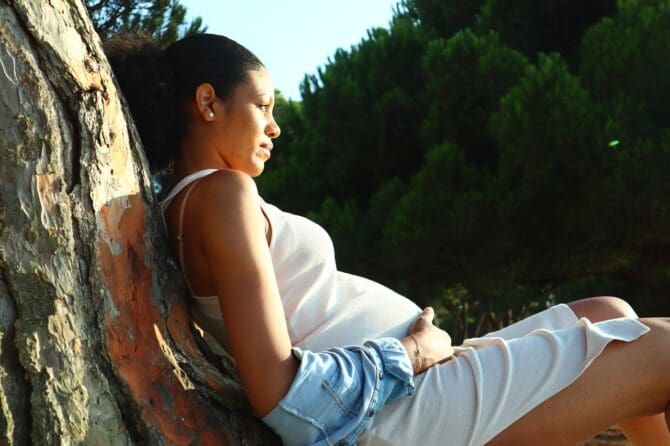Menopause can be a crazy time for women. One of the most common topics people are understandably interested in learning more about is: Can you get pregnant during menopause? The answer is that yes, in some cases you might still be able to. Although it’s important to know how pregnancy occurs during menopause so as not to worry or cause yourself further stress when it comes down to your own experience!
When estrogen and progesterone levels are minimal for a consecutive period of 12 months, menopause is said to occur. Due to the lack of menses in menstruating women, and the absence of fluctuating estrogen and progesterone production, it marks that egg production has ceased. At this point in time, an ovary will not hold an egg for potential implantation.
Hormone production can continue after a woman enters menopause because menopause is not characterized by one specific event. It should be thought of as a process that takes place over a few years. Why does this matter? It’s said that during this time, it isn’t uncommon to have unpredictable hormone levels for as many as five years after a woman becomes menopausal. But if you’re going through this process and still have fluctuating hormones at any point in this five-year period, there is a chance you could get pregnant during menopause.
Thus, if a woman has undergone a hysterectomy and/or because of certain medical conditions, she may wish to consider having conversations with her doctor about seeing if birth control is right for her during menopause.
It is reported that women cannot become pregnant after menopause, so upon reaching menopause, the female now does not produce the hormones required for menstruation. Women who believe they have become pregnant after menopause are actually, in fact, still during menopause; pregnancy cannot occur unless or until estrogen and progesterone are produced.
Women who are over the age of 35 and have experienced an early menopause (before the age of 45) will still be able to take advantage of egg donation procedures to become pregnant. Though, it is vital for women who experience early menopause to understand that there are still certain risks involved in becoming pregnant, even when using a fertility clinic’s egg donation option.
Women of a certain age who become pregnant can be more vulnerable to certain dangers. At a younger age and earlier in their pregnancy, women are at greater risk for miscarriage and hemorrhaging, as well as other complications from high blood pressure in their veins during pregnancy. In addition, girls of any age may have higher chances of developing diabetes when they get pregnant; this is even more complicated if they reach menopause while they’re still of child-bearing age. Drinking while pregnant can not only lead to the stillbirth of an infant but also result in birth defects or developmental problems later on.
Although it’s rare for a woman to become pregnant during her menopausal period, it is possible. Menopausal pregnant women must be watched over by their physician so that the mother’s and unborn child’s health are protected.
If a woman were to become pregnant in her later years, this is extremely rare, at least for the most part. As such, despite what you may read about celebrities or other public figures and what may seem to be like a wonderfully ‘hot-off-the-presses’ article you came across online, if you have concerns about becoming pregnant or suspect that you are actually pregnant it’s advisable to speak with your gynecologist who will be able to help guide through these crucial moments.











